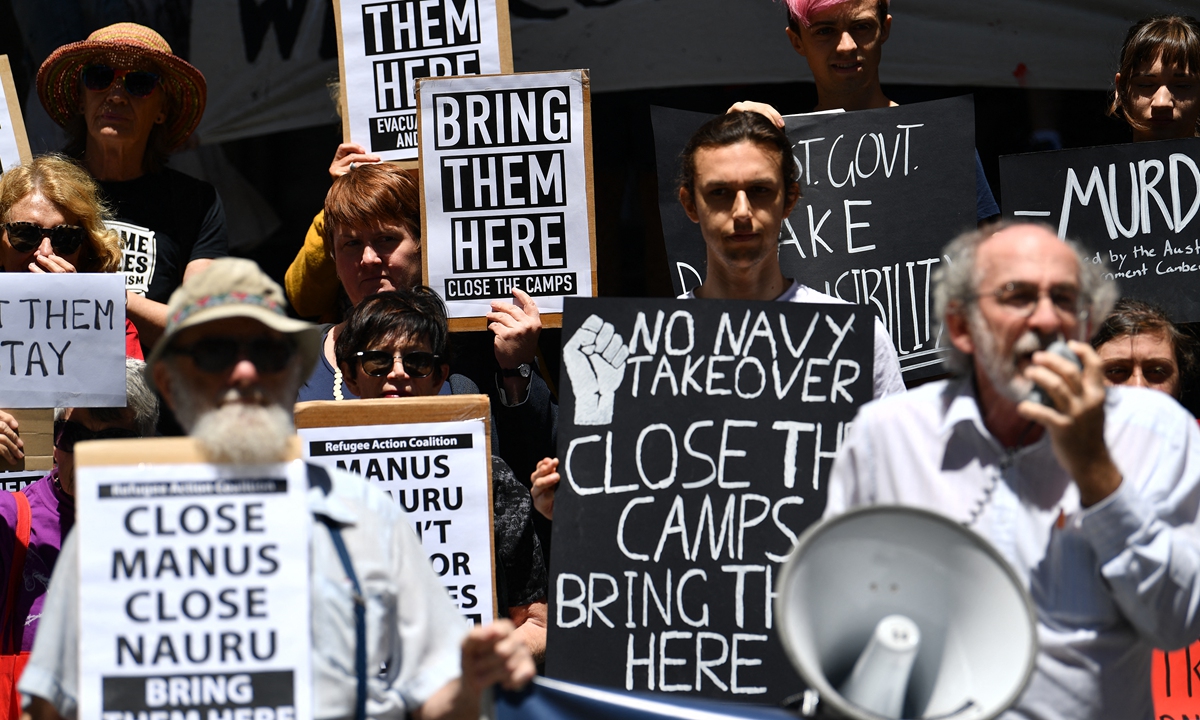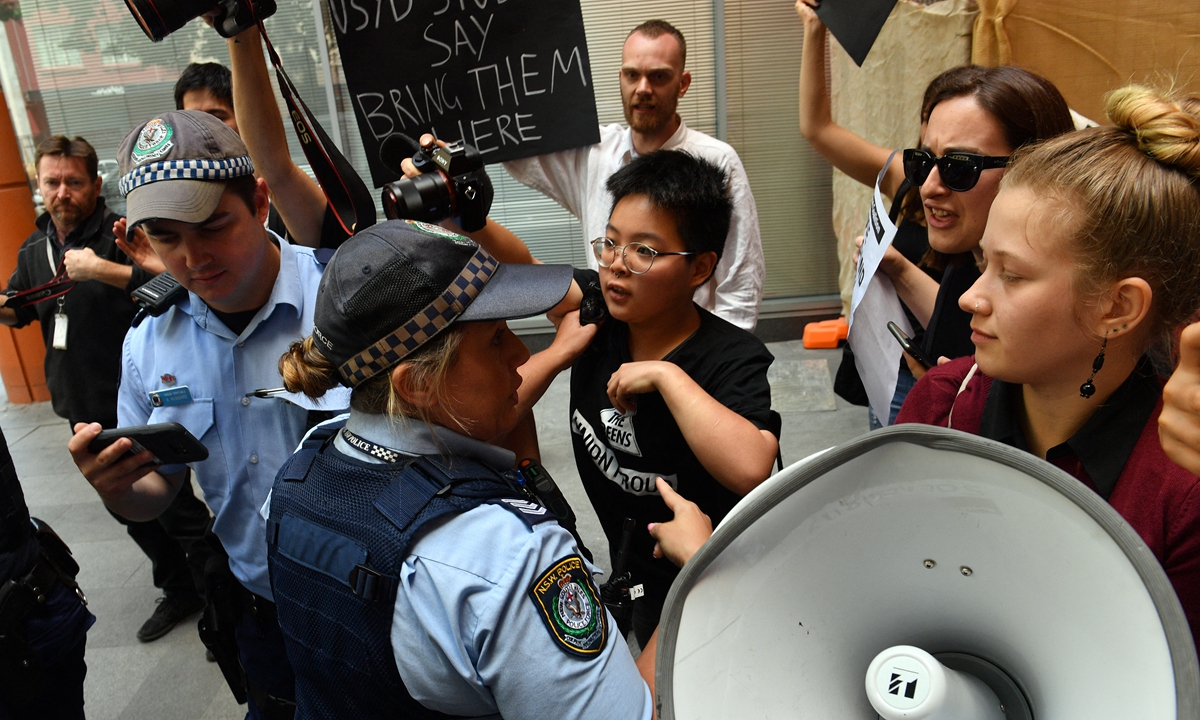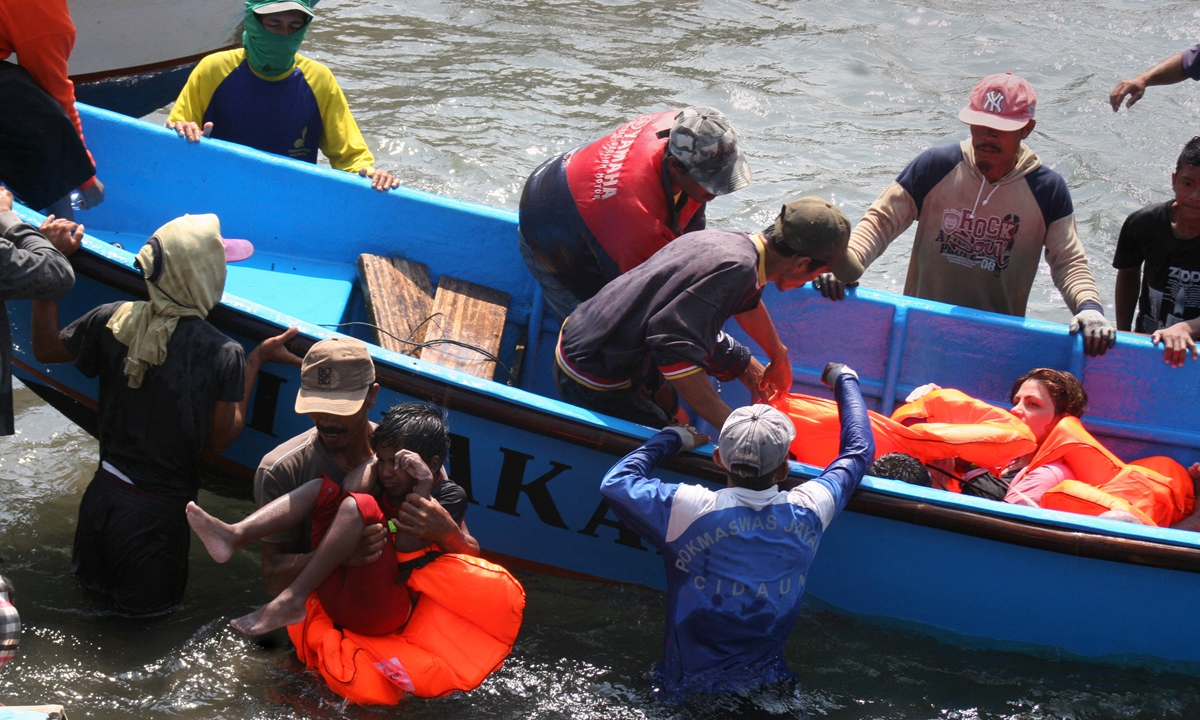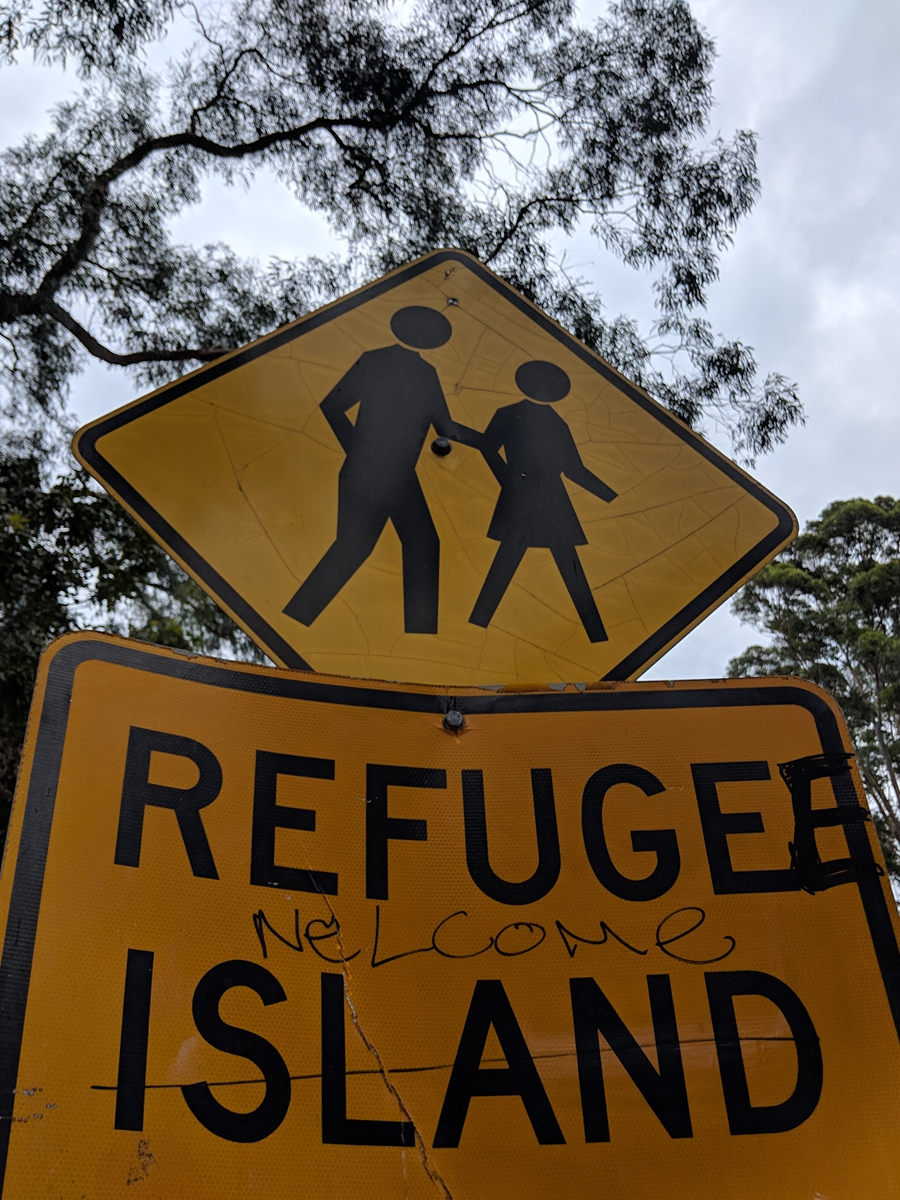
Refugee advocates protest against the closing of asylum seeker camps in Papua New Guinea, in front of the Sydney Commonwealth government offices on October 31, 2017. Photo: AFP
Editor's Note: Amid the smoke and flames from the Russian-Ukrainian conflict, Australia's absurd move has left the international community baffled. As an isolated Oceania island country, it frantically follows the US and European countries in their hysteria to sanction Russia and send weapons to Ukraine to further worsen the Ukraine crisis.
When it comes to refugee aid, an issue that the West is wont to hypocritically pay lip service to as a display of its respect for "human rights," Australia has not missed an opportunity to hype its involvement in the campaign, actively boasting about providing assistance without taking any real actions.
But the irony is that from unabashedly differential treatment of people of color to sending refugees overseas for detention and ignoring their desperate pleas... Australia has deluded itself into ignoring its appalling record of accepting and resettling refugees. Currently, as some of the refugees who had arrived in Australia began to talk about their losses, the role that Australia and its allies have played in one refugee crisis after another is becoming increasingly apparent to the international community.
The Global Times will publish a two-part series focusing on the mishandling of the
refugee crisis in the UK and Australia, which will offer a glimpse into the hypocrisy and double standards applied by this white-supremacist political community. This is part two of the series written by GT staff reporters.
'Stuck in limbo'
More than 1,700 Ukrainian refugees had arrived in Australia as of April 14, reported Australian media Special Broadcasting Service (SBS).
However, although the Australian federal government bragged that it would embrace Ukrainian refugees, many Ukrainians who had arrived in the country disappointingly found the welcome previously promised was no more than a political dog and pony show.
Many stories shared by Australian media in recent days revealed that the first batches of Ukrainian refugees arriving in Australia were having a hard time there. Instead of the temporary humanitarian visas that the Australian government reportedly promised them in late March, most of the homeless Ukrainians arriving in Australia received only visitor visas limiting access to medicare and a right to lawfully work.
The Ukrainian refugees in Australia "have found themselves stuck in limbo," said an article published by SBS on April 14. It mentioned the case of a 34-year-old Ukrainian man, Yevhen Kalivod, who said he felt "stressed and confused" since arriving in Australia at the end of March. The visa obstacles had prevented him from starting a life in Australia, Kalivod said.

Police officers block refugee advocates' action at the Immigration and Department of Foreign Affairs and Trade building in Sydney on November 3, 2017. Photo: AFP
"I feel absolutely horrible... no money, no house, and now I can't find a job," he told SBS. "People are shocked; they want clarity on how they can live here. There is no information and no direction."
Ukrainian refugees have entered Australia "only to find no further support to survive," criticized The Australian on March 16. As the Australian government didn't provide a package of assistance to Ukrainian refugees, "the responsibility of finding food, clothing, accommodation, and medical care has fallen to community organizations," the newspaper said.
The public soon found that even the Ukrainian refugees in Australia hardly enjoy the treatment that the administration of Australian Prime Minister Scott Morrison had publicly promised them. It's nonetheless not a surprise that the Morrison administration's actions belied its words, said experts in refugee studies reached by the Global Times.
"Similar to Japan, Australia has been keen on offering lip service with slogans like 'welcome Ukrainian refugees' since the conflict broke out, but it has accepted very few Ukrainians compared with some European countries," said Song Quancheng, head of the Institute of Migration Studies at Shandong University.
Canberra clearly knows Australia is not the first destination of choice for the faraway Ukrainian refugees, meaning it will only have to "pay a low cost" for displaying a disingenuous welcoming attitude, Song said. "For the Australian government, it can both express its humanitarian concern in the international community, and uphold the anti-Russia sentiment as spearheaded by US-led NATO, by simply feigning concern publically," he told the Global Times. "It's very hypocritical."
Following the pace of the US on the Ukrainian refugee issue is consistent with Australia's political calculation, Song noted. "Australia's interests have been tied to those of the US since the end of WWII. The US has had a major influence on various aspects of Australia, from national security to social culture," he said.
Therefore, be it on the previous US-launched trade war against China or on the Ukrainian refugees, Australia always colludes with the US, "and we can see that sometimes the Morrison administration even goes further than the US government," said Song. "Australia has no independent attitude," he concluded.
A vassal of the USThough a far-flung and isolated country, Australia has always had a dream to become a big power in the global order and appeared, whenever it could, to have followed in the steps of its big brother the US, and its allies.
Analysts pointed out that the essence of Australia's diplomacy is dedicated to currying favor with the West and subduing Asia. Australia has been involved in every US-led war since WWII - the Korean War (1950-53), the Vietnam War, the Gulf War, and the Afghan and Iraq wars - even though the battlefields are thousands of miles away from its seat of power in Canberra.
In the early 1950s, for instance, nearly 18,000 Australian servicemen fought the distant war in the Korean Peninsula, according to the National Museum of Australia. Australia would not have taken any diplomatic initiative without conferring with the US. Australia followed the US into the Vietnam War, and its subsequent regrets are barely mentioned. This alone did not deter former prime minister John Howard from following the US into the wars in Iraq and Afghanistan, said Bruce Haigh, an Australian political commentator and a former diplomat.
After the 9/11 attacks, the then US president George W. Bush claimed Iraq was secretly aiding terrorists and developing weapons of mass destruction. After that, Howard used the same excuse for Australia's involvement in the subsequent US-led invasion of Iraq in 2003, according to ABC.
Experts noted that Australia's involvement in the invasion of Iraq was not accidental, but a continuation and a logical certainty of its actions and motives since WWII.
Moreover, apart from participating in wars, Australia has also actively helped the US to "solve problems" resulting from the wars. Whether it was the disposal of refugees from the Vietnam War or those from wars after the 9/11 incident.
"Australia lacks leadership and has done so since Howard became prime minister in 1996. Australia was a colonial settlement that displaced the local indigenous inhabitants... It is inwardly focused and narrow in its outlook," Haigh told the Global Times earlier.
"Australian diplomacy has become increasingly undiplomatic in recent years. On a range of major foreign relations issues, Australia has behaved in an extremely reckless manner. The Canberra's authorities display a headstrong attitude in tying Australia's fate to that of the US, and are fighting to maintain US hegemony at all costs," said Chen Hong, president of the Chinese Association of Australian Studies and director of the Australian Studies Center at the East China Normal University.
Unspeakable sins

Rescuers assist survivors arriving on fishing boats at the West Java, Indonesia on July 24, 2013 after an Australia-bound boat carrying asylum seekers sank off the Indonesian coast. Photo: AFP
"Morrison's 'compassion' toward the refugees of Ukraine is revealing the hypocrisy of his government and ethnic double standards," wrote an article published on the Independent Australia website.
"Unfortunately ...today many are still uncertain about their [Afghan refugees'] applications for protection in Australia," said Australian Labor Party's spokesperson Kristina Keneally, as reported by the Guardian on March 2.
As an immigrant and island country where isolationist sentiments prevail, Australia has been very cautious about accepting refugees. While it claims that it has a strong commitment to resettling refugees, it also has a long history of abusive treatment toward refugees.
Chen pointed out that there are two undercurrents at the root of Australian national culture - white Australiaism, and conservative right-wing thinking, which, combined, contribute to Australia's domestic and foreign policy base.
After the end of WWII, Australia, with its vast landmass, was desperate for a larger population to develop its economy, so it took in some refugees from Eastern Europe. Later, due to the increasing number of immigrants from the Middle East, the Australian government formulated the first refugee policy in 1977 to control the entry of refugees.
In the mid-to-late 1980s, the Australian government created a model of mandatory incommunicado detention for refugees, and the policy has survived to this day: All refugees arriving by boat off the coast of Australia are transferred to detention centers on Australia's outlying islands or in Papua New Guinea and Nauru, where they await the outcome of Australian processing - repatriation to their home country or transportation to a third country.
Although the Australian government has strongly justified the introduction of such a policy to combat the so-called illegal immigration and human trafficking, analysts noted that the underlying reason for the policy is the rejection of refugees, especially the large number of people of color in Australian society.
In 2001, in order to prevent the entry of 433 refugees from Afghanistan and Iraq on a Norwegian freight ship, The MV Tampa, Australia sent special forces to forcibly control the crew. Under international pressure, the Australian government reluctantly took in some of the refugees to incommunicado detention, but ultimately did not allow any of the 433 to enter the country.
According to ABC News, the conditions of the detention centers are extremely rudimentary. Refugees not only have no access to medical care when they fall ill but also face dangers, with frequent violent attacks and sexual assaults by locals.
In August 2016, a report covered more than 2,000 leaked incident reports from Australia's detention camp for asylum seekers on the remote Pacific island of Nauru - totaling more than 8,000 pages - and were published by the Guardian, among which a total of 1,086 incidents, or 51.3 percent, involve children.
In May 2019, following the successful reelection of Morrison, refugees in Australia detained on Papua New Guinea's Manus Island expressed growing despair, with at least 10 people attempting to commit suicide or committing self-harm, the Aljazeera reported
Despite the United Nations and a number of agencies in Australia have long criticized the serious human rights violations in these detention centers, "the Australian government blatantly ignores the on-island abuses in order to deliberately deter refugees from arriving in the country by boat," ABC News reported.
Instead of reflecting on its own sins, however, Australia has taken actions to promote this model of inconsiderate treatment of refugees, Chen said, noting that the Australian program of refugee overseas incommunicado detention is now being emulated by Western countries, such as the UK's recently proposed Rwanda Plan, deporting some asylum seekers to Rwanda, East Africa.
"Australia has never been absent from the political farce created by the US and the West, and is currently pushing this farce to further its own selfish interests," he said.

A Refugee Island sign in Australia. Photo: VCG







